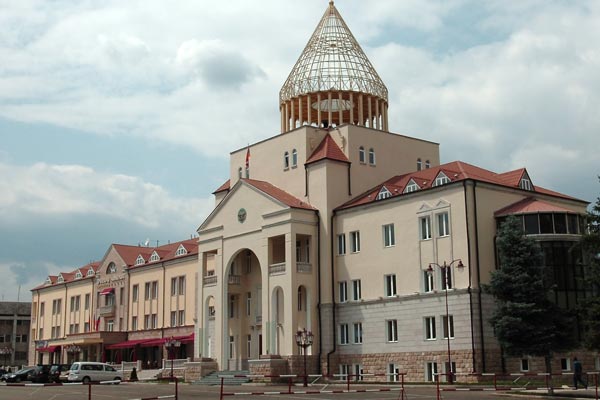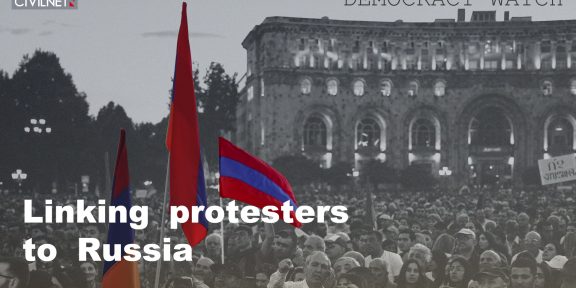 Parliament building of Nagorno-Karabakh.
Parliament building of Nagorno-Karabakh.
The Republic of Nagorno Karabakh held its sixth parliamentary election since independence on May 3, 2015.
According to the Central Electoral Commission, over 70 percent of the 101,653 eligible voters of Karabakh took part in the elections. There were 206 candidates vying for a seat in the 33-person mixed-member proportional legislature – 22 seats will be filled via political party lists (proportional) while 11 are single-mandate or majoritarian seats.
While the final official results of the election for both single-mandate and majoritarian are to be released, at this time, five political parties have crossed the minimum 5 percent threshold to secure seats in the parliament. The following are the preliminary results:
The Free Motherland Party, headed by NKR Prime Minister Ara Harutyunyan received 47.5 percent of the vote; the Democratic Party of Artsakh, led by speaker of the NKR parliament Ashot Ghulyan, garnered 19.1 percent; the ARF-Dashnaktsutyun led by NKR Deputy Prime Minister Artur Aghabekyan got 18.8 percent of the vote; Movement 88, led by former deputy defense minister and former NKR presidential candidate Vitaly Balasanyan received 6.93 percent and the National Rebirth party, led by Hayk Khanumyan received 5.38 percent.
International observers from all over the world took part in the elections. The European Armenian Federation for Justice & Democracy (EAFJD) brought a a ten-member team of professional Short Term Observers (STO) from Austria, Ireland, England, Italy, Greece, Switzerland, the Czech Republic, Romania and the Netherlands. According to the EAFJD, the observers have extensive experience in monitoring elections all over the world.
The European Friends of Armenia also brought a delegation headed by Frank Engel, President of the Artsakh Group in the European Parliament, and was composed of several MEPs and supporting staff. They conducted their activities from May 2-4, and also cooperated with other Parliamentarians of EU Member States. According to the report on the elections, the European Friends of Armenia observer mission said: “Overall, the electoral process took place in line with international standards and represents not only progress, but also a clear consolidation of democracy and rule of law in the Republic of Nagorno-Karabakh.”
Observers from the United States were also in Nagorno Karabakh following the elections throughout the day. The observation mission included ANCA Western Region’s Nareg Kitsinian, Esq. and Tereza Yerimyan; Andreas Borgeas, Fresno City Councilman; Karin MacDonald, Director of UC Berkeley Law’s Election Administration Research Center; Peter Abajian Executive Director of PAROS Foundation; Gail Pellerin, Santa Cruz County Clerk; and UC Davis Student and EARC intern Kristin Abajian.
French Parliament Member Francois Rochebloine, reported that “Everything went perfect and fair. We participated in the vote count in one precinct, where everything was transparent and balanced, and there was no tension.”
Meanwhile, on April 30, the OSCE Minsk Group Co-Chairs (Ambassadors Igor Popov of the Russian Federation, James Warlick of the United States of America, and Pierre Andrieu of France) issued a statement following their meetings with Armenia’s Foreign Minister Edward Nalbandian and Azerbaijan’s Foreign Minister Elmar Mammadyarov in Paris and ahead of the parliamentary elections in Karabakh.
Referring to the May 3 parliamentary elections, the co-chairs stated: “In the context of a comprehensive settlement of the conflict, we recognize the role of the people of Nagorno-Karabakh in deciding their future. However, none of our three countries, nor any other country, recognizes Nagorno-Karabakh as an independent and sovereign state. Accordingly, we do not accept the results of these ‘elections’ as affecting the legal status of Nagorno-Karabakh, and stress that they in no way prejudge the final status of Nagorno-Karabakh or the outcome of the ongoing negotiations to bring a lasting and peaceful settlement to the Nagorno-Karabakh conflict.”
The OSCE Minsk Group, created in 1992 was created to mediate and encourage a peaceful and long-lasting resolution of the Karabakh Conflict.
















